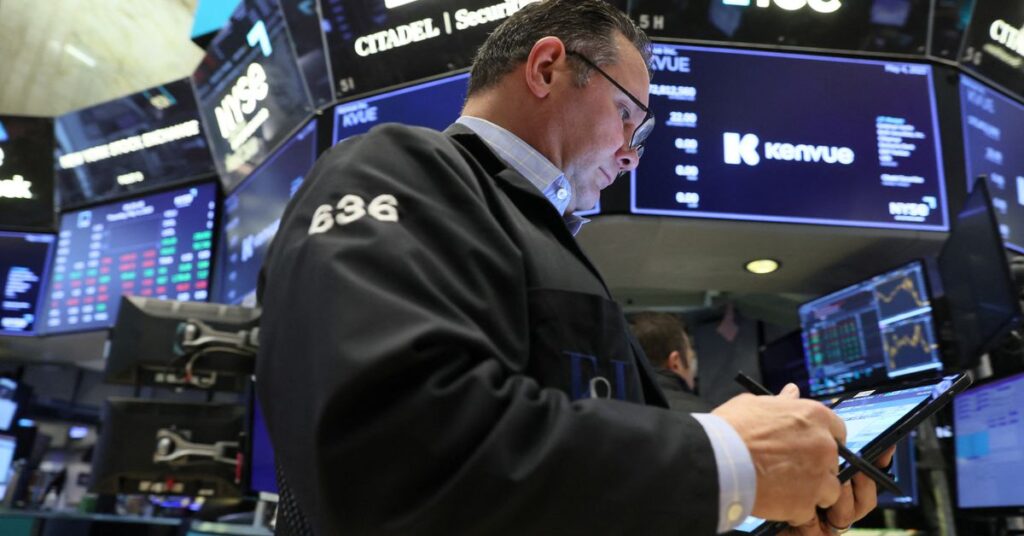SINGAPORE, May 5 (Reuters) – A global gauge of stocks rallied and U.S. Treasuries and gold sold off on Friday as strong U.S. jobs data brightened the economic outlook and traders pared expectations of Federal Reserve easing after a long spate of rate hikes.
The non-farms payroll report showed U.S. employers added 253,000 new jobs in April, up from 165,000 in March and exceeding expectations for 180,000.
U.S. Treasury yields rose after the report while the dollar was down very slightly against a basket of major currencies.
Oil prices jumped on signs of economic strength, but registered their third weekly decline in a row. Shares in U.S. banks also erased some losses after a rough week following the collapse of a third major bank.
Since Fed Chair Jerome Powell signaled that the central bank could pause hikes traders have been betting this would happen at the June meeting with some even calling for rate cuts in July, according to CME Group’s FedWatch tool. After Friday’s data, the probability for a July cut declined.
But still Friday’s trading suggested a focus on signs of economic strength rather than on the prospects for tighter policy, which often come with stronger than expected data.
“The pause button has likely been pressed and now it’s about the state of the U.S. economy and what we saw today suggests it’s in a better position that previously expected,” said Kristina Hooper, chief global market strategist at Invesco, New York. “The caveats are that one data point does not a picture paint and, to a large extent, employment is a lagging indicator for the state of the economy.”
But while decent growth may not lead to more tightening in the short run Sameer Samana, senior global market strategist at Wells Fargo Investment Institute in Charlotte, North Carolina, disagrees with the market’s “Goldilocks scenario” where growth slows without a hard recession and the Fed can ease policy quickly.
“If the Fed is cutting rates aggressively in the back half of the year, something has gone very wrong economically,” he said adding that, for now, the market has a short term focus.
MSCI’s gauge of stocks across the globe (.MIWD00000PUS) was gaining 1.48% and on track for its biggest one-day percentage gain since Jan. 6. However, for the week it still showed a small decline.
The Dow Jones Industrial Average (.DJI) rose 546.64 points, or 1.65%, to 33,674.38, the S&P 500 (.SPX) gained 75.03 points, or 1.85%, to 4,136.25 and the Nasdaq Composite (.IXIC) added 269.02 points, or 2.25%, to 12,235.41.
Under the hood, oil’s rebound helped boost the energy equity index (.SPNY). U.S. crude settled up 4.05% at $71.34 per barrel and Brent ended at $75.30, up 3.86%.
The biggest boost from a single stock for all three major U.S. indexes was from technology heavyweight Apple Inc (AAPL.O) which soared after its quarterly report impressed investors.
Investors also paused their exit from U.S. banks pushing the KBW regional bank index (.KRX) up 4.7%. However the regional index was still down almost 8% for the week on sharp declines in the previous four sessions after the weekend collapse of First Republic Bank.
In currencies, the dollar index fell 0.059%, with the euro up 0.05% to $1.1016. The Japanese yen weakened 0.39% versus the greenback at 134.84 per dollar, while sterling was last trading at $1.2633, up 0.49% on the day.
In Treasuries, benchmark 10-year notes were up 7.9 basis points to 3.431%, from 3.352% late on Thursday. The 30-year bond was last up 2.4 basis points to yield 3.7464%. The 2-year note was last was up 18.7 basis points to yield 3.9139%.
After getting close to a record high in the previous session, gold beat a fast retreat after the payrolls data tempered expectations for Fed rate cuts.
Spot gold dropped 1.7% to $2,017.03 an ounce. U.S. gold futures fell 1.76% to $2,017.40 an ounce.
Editing by Jacqueline Wong
: .


